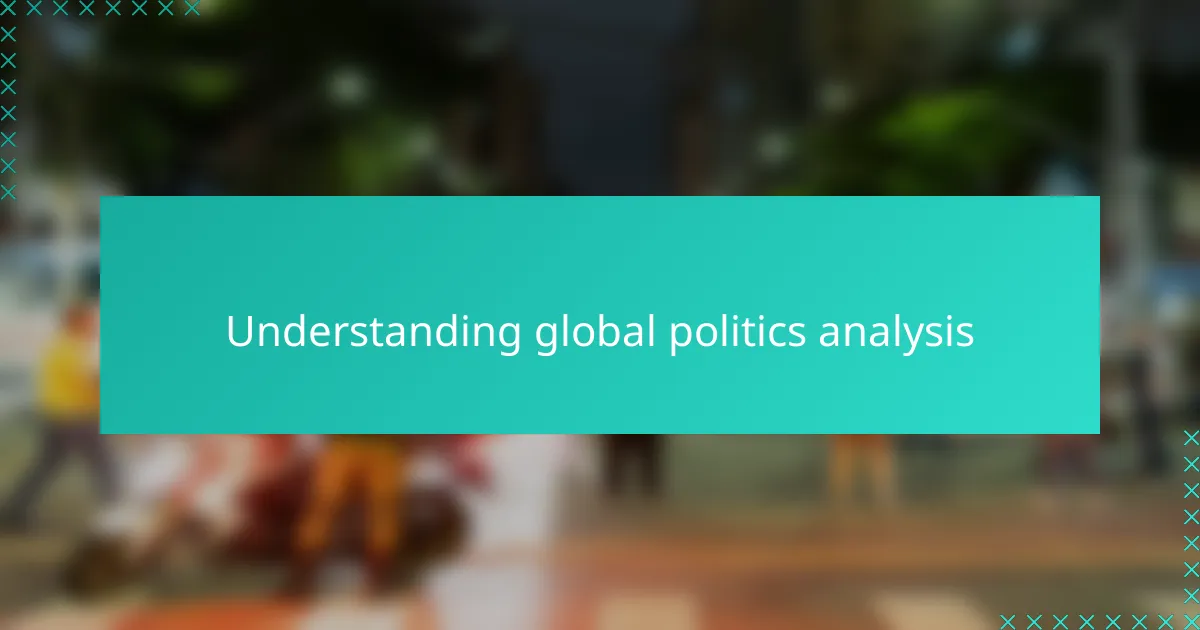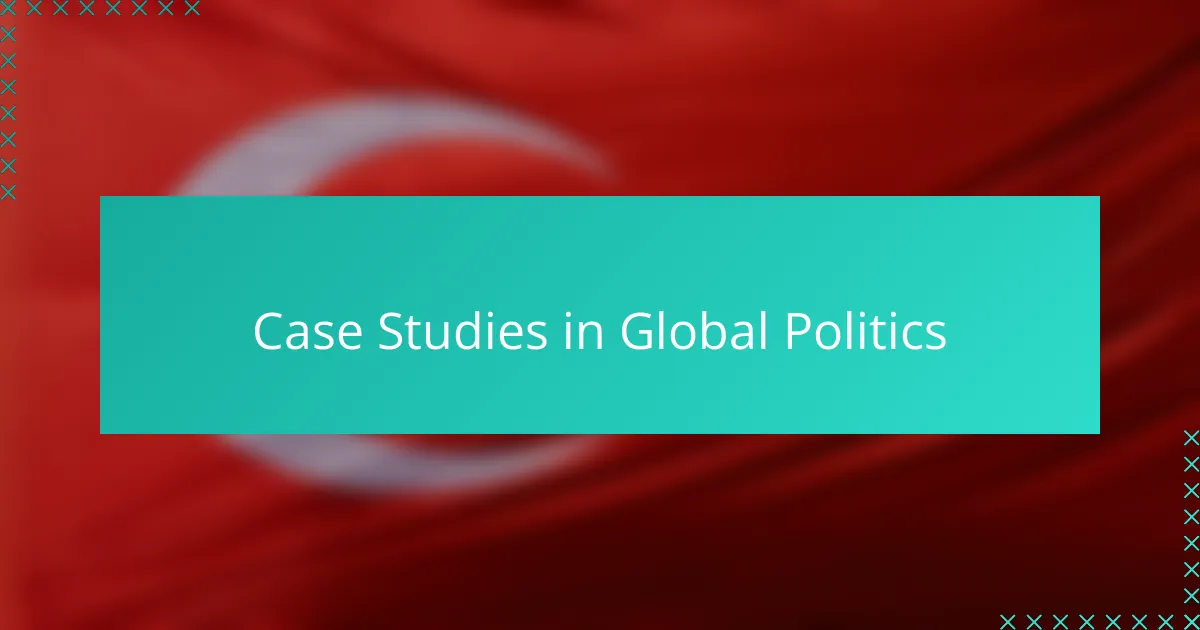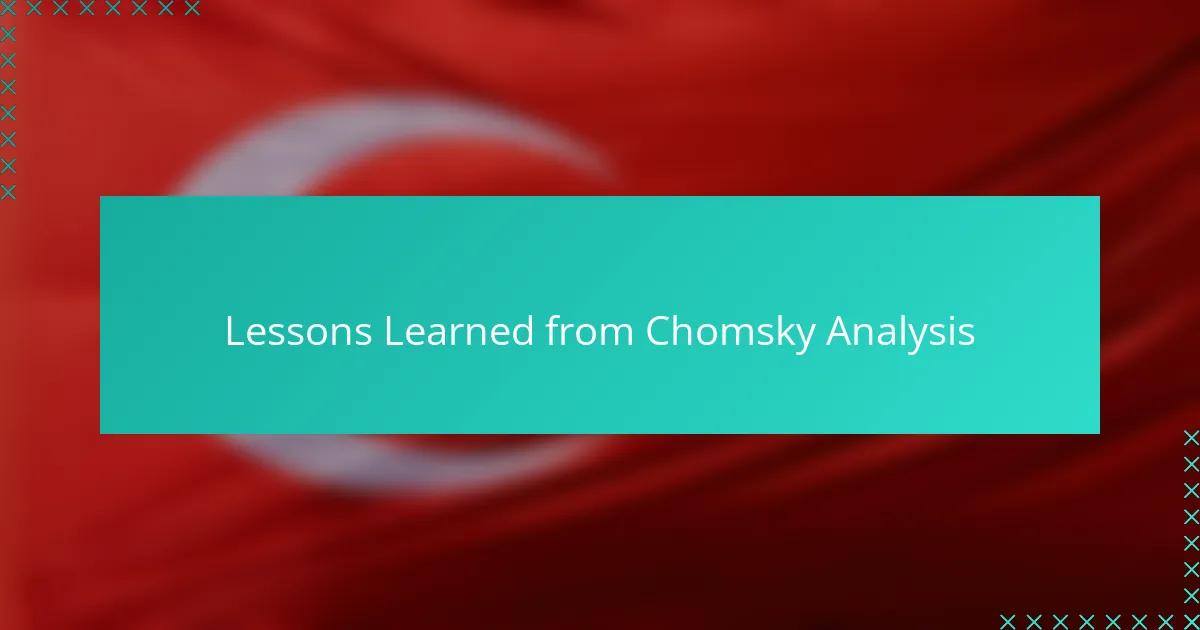Key takeaways
- Understanding global politics requires deep analysis of cultural values, power dynamics, and economic pressures, transcending surface-level headlines.
- Chomsky’s emphasis on “manufacturing consent” encourages critical questioning of media narratives, prompting an examination of who benefits from specific political stories.
- Utilizing tools like historical context and quantitative data enhances political analysis, transforming it into a more informed and nuanced practice.
- Case studies illustrate the human cost behind policies, reinforcing the importance of exploring the underlying power structures at play in global events.

Understanding Global Politics Analysis
Understanding global politics analysis demands more than just scanning headlines; it requires diving into the nuanced layers beneath international decisions. I remember feeling overwhelmed at first—so many actors, interests, and historical contexts seemed to swirl endlessly. Have you ever wondered why some countries act in ways that defy common sense at first glance? That’s where deeper analysis bridges the gap.
From my experience, analyzing global politics is like piecing together a complex puzzle where every piece represents cultural values, power dynamics, and economic pressures. When I step back and connect these dots, patterns emerge that explain actions on the world stage, making global events feel less chaotic and more meaningful. It’s a continuous process of questioning assumptions and embracing complexity.
Ultimately, understanding global politics analysis is about recognizing that no event exists in isolation. Sometimes, I find myself empathizing with policymakers juggling conflicting priorities—reminding me that behind every headline lie human decisions deeply influenced by the global environment. This perspective enriches how I interpret international affairs and invites any reader to approach these topics with curiosity and critical thinking.

Key Concepts in Chomsky’s Thought
Chomsky’s ideas often revolve around the concept of power—how it operates behind the scenes to shape public opinion and policy. When I first encountered his notion of “manufacturing consent,” it hit me how media can quietly steer society’s views without most people noticing. Isn’t it unsettling to realize that what we take as “common sense” might actually be carefully crafted narratives serving certain elites?
Another cornerstone of his thought is the deep skepticism toward official explanations, especially those coming from governments. I remember wrestling with this idea because it challenged my tendency to trust mainstream sources. But then I asked myself, what if questioning those narratives is the only way to uncover the real motives that often lie hidden beneath diplomacy and rhetoric?
Finally, Chomsky’s focus on structural inequalities made me reflect on how global politics isn’t just a chessboard for states but a system where economic forces create lasting imbalances. It’s a reminder that the struggles of marginalized groups worldwide are not random but tied to entrenched power hierarchies. Have you ever considered how these invisible structures shape lives beyond what the headlines tell us?

Tools for Analyzing Political Ideas
When I started analyzing political ideas, I quickly realized that without the right tools, it’s like trying to read a foreign language without a dictionary. I rely heavily on frameworks like discourse analysis and critical theory because they help me peel back the layers of language and ideology that often mask deeper power relations. Have you ever noticed how certain phrases or terms keep popping up in political speeches? That’s not accidental—it’s a tool for shaping thought, and recognizing it changed how I read those messages entirely.
Another tool I find essential is historical contextualization. At first, I underestimated how much history influences political ideas until I saw how Chomsky’s critiques connect directly to specific events and policies over decades. Diving into the historical background made his arguments feel less abstract and far more urgent. When you know the story behind a political claim, it stops feeling like propaganda and starts to feel like a warning or a call for action.
Quantitative data also plays a surprising role in my analysis. While Chomsky’s work is often philosophical, combining it with statistics on media ownership or economic disparities grounded his ideas in reality for me. It’s a blend of hard numbers and critical reflection that brings clarity. Don’t you find it intriguing how numbers can confirm what intuition and close reading suggest? This balance between qualitative and quantitative tools sharpens my insight every time.

Applying Chomsky’s Framework
Applying Chomsky’s framework felt like unlocking a new lens through which to view global politics—one that insists on looking beyond surface narratives to the hidden power structures shaping events. I recall the moment I realized that questioning official stories wasn’t just healthy skepticism but essential to grasping the full picture. Have you ever found yourself doubting the simplest explanations just because something felt off? That’s exactly where Chomsky’s approach guided me.
What struck me most was how his emphasis on media’s role in “manufacturing consent” transformed the way I approach news. Instead of passively absorbing headlines, I began to ask who benefits from this story, and whose voices were missing. This shift wasn’t easy; it challenged my comfort with familiar sources but ultimately made my analysis richer and more critical.
Applying his ideas also meant confronting uncomfortable truths about systemic inequalities embedded in global politics. At times, it felt almost overwhelming to grasp the layers of economic and ideological control at play. Yet, acknowledging this complexity gave me a deeper empathy for those often sidelined in international discourse—and a stronger commitment to question the status quo every time I analyze a political event.

Case Studies in Global Politics
Case studies in global politics have been invaluable in grounding abstract theories into real-world events. I recall analyzing the Cuban Missile Crisis through Chomsky’s lens and realizing how propaganda shaped public perception differently across countries. Doesn’t seeing theory meet practice this way make the complexities of global power feel more tangible?
Diving into specific case studies also revealed patterns of systemic inequality that Chomsky emphasizes. For instance, studying the economic interventions in Latin America uncovered not merely isolated incidents but a consistent framework of dominance. Have you ever noticed how these repeated interventions echo a larger narrative about control and consent?
What I find most striking is how case studies force us to grapple with the human cost behind geopolitical decisions. When I looked at the sanctions on Iraq or the media coverage of the Vietnam War, it wasn’t just policy on paper—it was millions of lives affected by unseen power plays. This realization deepened my commitment to never accept political narratives at face value and to look for those hidden stories every time.

Lessons Learned from Chomsky Analysis
Reflecting on my analysis of Chomsky’s ideas, one lesson stands out clearly: always question what seems obvious. I once accepted media narratives without hesitation, but Chomsky taught me to dig deeper—asking who really benefits and what’s left unsaid. Have you ever caught yourself nodding along to a news story, only to realize later that you missed the underlying power dynamics? That moment of awareness changed the way I approach information.
Another insight I gained is the importance of patience when confronting systemic inequality. Initially, I felt overwhelmed trying to untangle complex economic and ideological forces. But slowly, I learned that acknowledging these persistent structures is crucial to understanding global politics honestly. Don’t you think facing uncomfortable truths is necessary if we want meaningful change, rather than comforting ignorance?
Finally, the personal impact of seeing how hidden power shapes lives can’t be overstated. When I studied Chomsky’s critiques alongside real-world events, it wasn’t just academic—it was deeply humanizing. Recognizing the suffering and silenced voices behind policy decisions strengthened my resolve to keep searching beyond surface explanations. Hasn’t that deeper empathy turned political analysis from a mere intellectual exercise into something much more urgent and relevant?

Practical Tips for Political Analysis
One practical tip I’ve found indispensable is cultivating a habit of active questioning. Instead of accepting statements at face value, I ask myself, “Who benefits from this narrative?” This simple practice has transformed how I dissect political discourse, revealing layers that are often invisible on the surface.
Another approach that’s helped me tremendously is interdisciplinary reading. Politics doesn’t exist in a vacuum, so drawing insights from history, economics, and media studies enriches my analysis. For example, understanding economic trends alongside political statements often uncovers underlying motives that I would have missed otherwise.
Finally, I’ve learned the value of patience and openness to complexity. Political analysis is rarely straightforward, and rushing to conclusions can be misleading. Have you ever felt frustrated by conflicting information? I have too. Embracing that discomfort as part of the process makes my interpretations more nuanced—and, honestly, more rewarding.
